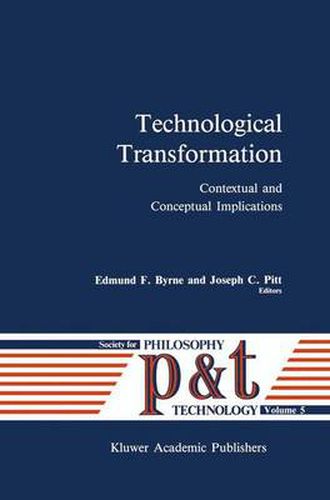Readings Newsletter
Become a Readings Member to make your shopping experience even easier.
Sign in or sign up for free!
You’re not far away from qualifying for FREE standard shipping within Australia
You’ve qualified for FREE standard shipping within Australia
The cart is loading…






This title is printed to order. This book may have been self-published. If so, we cannot guarantee the quality of the content. In the main most books will have gone through the editing process however some may not. We therefore suggest that you be aware of this before ordering this book. If in doubt check either the author or publisher’s details as we are unable to accept any returns unless they are faulty. Please contact us if you have any questions.
The philosophical study of technology has acquired only recently a voice in academic conversation. This situation is due, in part, to the fact that technology obviously impacts on the real world, whereas the favored stereotype of philosophy allegedly does not. Furthermore, in some circles it was assumed that philosophy ought not impinge on the world. This bias continues today in the form of a general dismissal of the growing area now referred to as applied philosophy . By contrast, the academic scrutiny of science has for the most part been accepted as legitimate for some 30 years, primarily because it has been conducted in a somewhat ethereal manner. This is, in part, because it was believed that, science being pure, one could think (even philosophically) about science without jeopardizing one’s intellectual purity. Since World War II, however, practitioners of the metascientific arts have come to ac knowledge that science also shows signs of having touched down on numerous occasions in what can only be identified as the real world. No longer able to keep this banal truth a secret, purists have sought to defuse its import by stressing the difference between pure and applied science; and, lest science be tainted by contact with the world through its applications, they have devoted additional energy to separating applied science somehow from technology.
$9.00 standard shipping within Australia
FREE standard shipping within Australia for orders over $100.00
Express & International shipping calculated at checkout
This title is printed to order. This book may have been self-published. If so, we cannot guarantee the quality of the content. In the main most books will have gone through the editing process however some may not. We therefore suggest that you be aware of this before ordering this book. If in doubt check either the author or publisher’s details as we are unable to accept any returns unless they are faulty. Please contact us if you have any questions.
The philosophical study of technology has acquired only recently a voice in academic conversation. This situation is due, in part, to the fact that technology obviously impacts on the real world, whereas the favored stereotype of philosophy allegedly does not. Furthermore, in some circles it was assumed that philosophy ought not impinge on the world. This bias continues today in the form of a general dismissal of the growing area now referred to as applied philosophy . By contrast, the academic scrutiny of science has for the most part been accepted as legitimate for some 30 years, primarily because it has been conducted in a somewhat ethereal manner. This is, in part, because it was believed that, science being pure, one could think (even philosophically) about science without jeopardizing one’s intellectual purity. Since World War II, however, practitioners of the metascientific arts have come to ac knowledge that science also shows signs of having touched down on numerous occasions in what can only be identified as the real world. No longer able to keep this banal truth a secret, purists have sought to defuse its import by stressing the difference between pure and applied science; and, lest science be tainted by contact with the world through its applications, they have devoted additional energy to separating applied science somehow from technology.